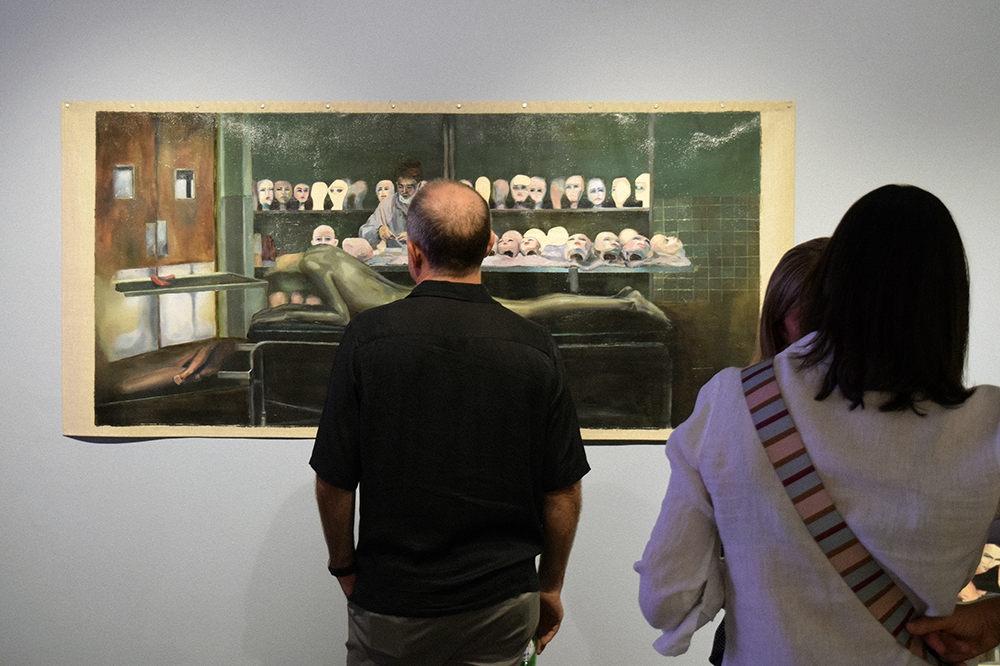
Where does your interest in art and culture come from?
I'm not going to tell you that it's because I'm French, that would be too easy. For me, art has always been fundamental. When I started planning my professional development, I studied art, but at that time it wasn't feasible so I did something else. However, to make up for it, I always made sure to go to a painting workshop for at least two hours while living in France.
When I left my country at 35, I asked myself what I would miss the most, and the answer was clear: art. So before moving, I took a three-week workshop to find out what materials I needed to take with me to stay connected and living art in my new life.
Are you still painting today?
At first I worked in sculpture. I had some African sculptures in my house that fascinated me because they weren't classics, but rather depictions of human beings made with metal or wood. Then I realized that with oil painting I could continue my artistic journey, inspired by Dalí. The last time I painted was during the pandemic, now I don't have much time.
Nowadays, my interest in art has been transformed. Now it motivates me more to see how we can create opportunities for people to develop and live from art. Rather than creating, I am interested in supporting those who do it.
How was your arrival in Chile and your approach to art here?
We arrived in Chile in 2020 and these last 3 years —since 2023— have been very good thanks to Antenna. I used to live in the Middle East, where there weren't many opportunities to experience art. In France, on the other hand, I participated in the Telerama association sponsoring theater, music and visual arts artists, and we were always looking at and evaluating how we could support those artists.
When I arrived in Oman there was nothing like that, so what we did was work with an association to bring artists from the Middle East to exhibit there. I lent my house and we received artists so that they could do their projects, in total we managed to do between 2 and 3 exhibitions. In addition, I participated in events organized by the Franco-Omanais Center in collaboration with the French Embassy. Once in Chile, the first person I met proposed that I invite young Chilean artists, from different regions, and invite them to do exhibitions in Santiago. With this modality, we managed to make four exhibitions before the pandemic. The first exhibition in which I participated here was in the Sala Gasco, with the works of the visual artists Dominique Schwarzhaupt, Ximena Velasco and María Inés Schmidt.
I currently work in the field of green energy, but I found a way to experience art through Antenna. A friend, a member of the foundation, invited me to a session and I loved the proposal and also the idea of being able to travel with the foundation and discover art, see workshops and artists from places like Lima, São Paulo, Rio or Bogotá, as well as in different parts of Europe. It is an invaluable contribution and openness to the cultural world.
What motivated you to join the Antenna community and how has this experience impacted your life?
What motivated me the most was to once again support artists and promote art in Chile. It was also the possibility of discovering Chilean art from the inside.
For me, art is a way of getting to know a country. I try to understand the identity of a place through art and, in Chile, it has been surprising to discover such diversity and originality. In addition, living as an expat is difficult; you know that at any time you can change countries. Before, it was unthinkable to settle in one place, but now we made the decision to gradually bring our house to Chile. Thanks to experiences like those at Antenna, we once again dreamed of investing in art for our home, which is something we share with our children. Something we are trying to do is buy a work depending on the countries we visit, we have a piece from Oman that reminds us of our life there.
From your perspective, what is the value of building a community around art?
For me, the value lies in support, collaboration and exchange. Art creates spaces where people can communicate and find common ground, regardless of their differences, in peace. The love of art can generate connection and unite us without limitations.
How has your relationship with art evolved over time? How has it influenced your way of seeing the world?
Art is soul, emotion, sensitivity. I used to think that there was a barrier between artists and collectors, especially in France where they don't usually get together. What I love about Antenna is that here the border is broken.
Art always leaves traces on those who live it. Could you share any significant learning that you have gained through your relationship with art and with Antenna?
I've learned that if you really like art, you need to invest in it. For me, buying art isn't just a transaction or investment, it's a way to support artists and take with you something that moves or likes you.
Last year we visited the SP Arte fair in Brazil and bought something that caught our attention. No matter what country we are in, we are always looking for ways to live and promote art. You have to stop, look and buy.

Tell us about an Antenna Session that was particularly meaningful to you.
In addition to my first session, which was the one that hooked me with Antenna and where I really enjoyed being able to hear the artist live, I remember a 2024 session at the Aninat Gallery to see the Mariana Najmanovich exhibition. His paintings depicted war scenes and had a profound impact on me. I like art that causes, that makes you uncomfortable, that forces you to question yourself.
Finally, we are not always looking for beauty, sometimes it is important for an artist to expose reality as it is, even if it is a risk. Mariana's exhibition generated conversations in my family after the session. I thought his way of taking that subject and taking it to an exhibition was very courageous.




%20(1).png)









